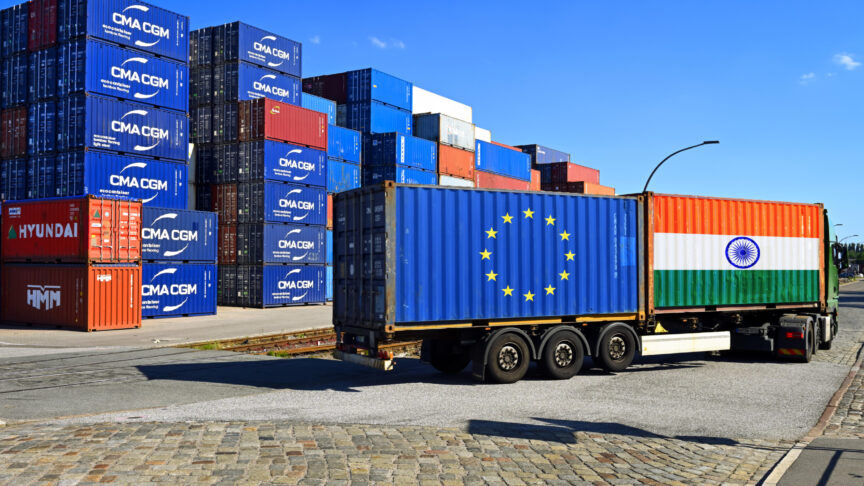Hungary’s migrant quota referendum: Never let a good crisis go to waste
A likely ‘no’ vote in Hungary’s legally questionable referendum will provide ammunition for Orbán’s battle with Brussels.
On October 2, Hungarians will take to the ballot box to answer the following question at a national referendum: Do you agree that the European Union should have the power to impose the compulsory settlement of non-Hungarian citizens in Hungary without the consent of the National Assembly of Hungary? According to polls, the majority will say “no”.
The referendum is the peak of a lengthy governmental campaign against EU migration policy that gained momentum in summer 2015 following a dramatic spike in the number of refugees seeking to enter the EU through the Balkan route. In response, the Orbán government erected a fence on the country’s southern borders, diverting the migrant flow toward its neighbors. Rejecting criticism of its hardline approach, the government stated that it was not turning away refugees but rather economic migrants and security threats, and that its actions were protecting the external borders of the EU to the benefit of all its members.
The European Commission’s proposal, voted on in September 2015, for the emergency resettlement of 120,000 refugees met with opposition from Hungary, the Czech Republic, Slovakia and Romania, but the four objecting countries were overruled by other members in the Council of Ministers. After being outvoted, the Hungarian government challenged the Council’s decision at the European Court of Justice. In parallel, Orbán’s administration set up a petition to “protect the country against the mandatory settlement quota” and subsequently initiated the national referendum now set for October 2.
Critics (watchdogs, legal experts and the majority of the opposition) have argued that the referendum question is unconstitutional.
Critics (watchdogs, legal experts and the majority of the opposition) have argued that the referendum question is unconstitutional. They say that the powers of the European Union are outside the jurisdiction of the Hungarian Parliament and that the question itself is not comprehensible. It is not obvious what ‘compulsory settlement’ refers to: the quotas adopted in September 2015 or something different.
Despite these concerns, the National Election Committee (NEC) approved the referendum question without hesitation, a decision backed by the Curia, Hungary’s Supreme Court. Eventually the Prime Minister stated that the referendum is not about the September quota, but something potentially occurring in the future. It is therefore still unclear what legislative action the referendum would trigger, with Orbán recently stating in Băile Tuşnad that this should be discussed once the referendum results are known.
While the referendum is legally questionable, the government is eager to give it political legitimacy. It argues that the referendum is a question about sovereignty and that the government needs a strong mandate to show Brussels that only Hungarians have the right to decide with whom they want to live. It is certainly not leaving this mandate up to chance: a media campaign of unprecedented intensity has been targeting the population since May, encouraging them to “send a message to Brussels,” providing often misleading information, while purposefully confusing correlation and causality when talking about migration and terrorism.
The campaign has had a clear impact on the population. According to Eurobarometer, 28% saw immigration as one of the top two issues facing Hungary in Spring 2016, while 67% see it as a top concern for the EU (up from 13% and 3% respectively last year). More worryingly, intolerance and xenophobia have also increased.
Referendum polls reflect these developments, with 54% of the electorate planning to vote (the referendum requires a 50% turnout to be valid) and intended ‘no’ votes outnumbering ‘yes’ votes by ten to one. The ‘no’ vote is supported by Jobbik, while the rest of the opposition is divided between boycotting the referendum (Socialists, Democratic Coalition, Dialogue for Hungary, and the Together party), leaving it up to their voters (Politics Can Be Different), and campaigning for ‘yes’ (Liberals).
A majority of ‘no’ votes thus seems inevitable, although a valid result is not yet assured. Regardless of what is understood by “compulsory settlement” and what role the national parliament has in EU decision-making, the result will be interpreted as a political mandate supporting the government in blocking any resettlement or relocation plans, or any harmonization toward a common asylum and migration policy. The Hungarian government will demand that the voice of Hungarians be taken seriously, claiming democratic legitimacy for its position and arguing that Hungary is the only country where people have been asked such a fundamental question.
While the referendum has no legal bearing on the European Union, should it be valid, Orbán will likely advocate renationalization of competences and a reduction of the Commission’s influence on policy.
Of course, the referendum is about more than asylum and migration policy. Orbán is also using popular concern over the refugee crisis to pursue his own vision of a Europe of nation states. While the referendum has no legal bearing on the European Union, should it be valid, Orbán will likely advocate renationalization of competences and a reduction of the Commission’s influence on policy. These are steps he considers essential across the board and which could involve a revival of the ‘red card’ concept, whereby member states’ parliaments could veto European laws before they enter into force.
Some worry that a valid referendum would lead to Hungary leaving the EU, as the Hungarian parliament will be obliged to take legislative steps, which would most likely be in conflict with European law. But considering that EU membership has significant support across the political spectrum, this would be a risky step for Orbán. It is more likely that the government will continue to question Commission proposals and the Council’s authority to decide on them with ordinary legislative procedures concerning asylum and migration policy. This in turn will deepen the government’s conflict both with the Commission and those member states which are in favor of more harmonization.
Furthermore, a successful (or just well-communicated) referendum could encourage other member states to question common EU decisions via national referenda, although this will depend on how the EU reacts to Orbán’s post-referendum steps. Nevertheless, his strong stance will most certainly encourage and empower other insurgent parties who sympathize with Orbán’s views. If he is in it for the long haul, ahead of the German and French elections in 2017, maybe this is all he needs.
Zsuzsanna Végh is Research fellow at the Center for European Neighborhood Studies, Central European University, and Associate Researcher at ECFR. The views expressed here are those of the author.
The European Council on Foreign Relations does not take collective positions. ECFR publications only represent the views of their individual authors.


